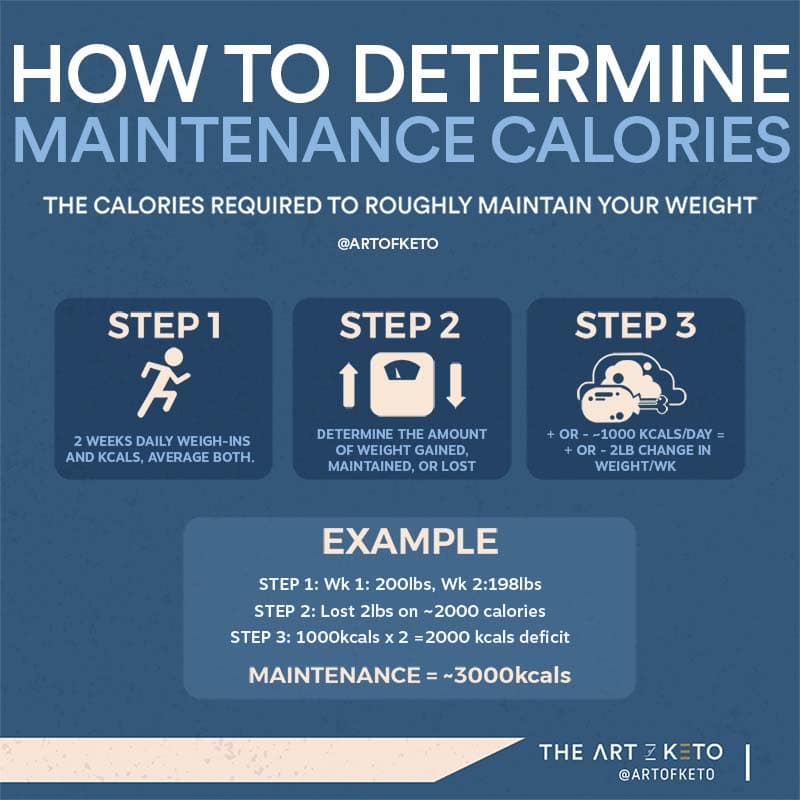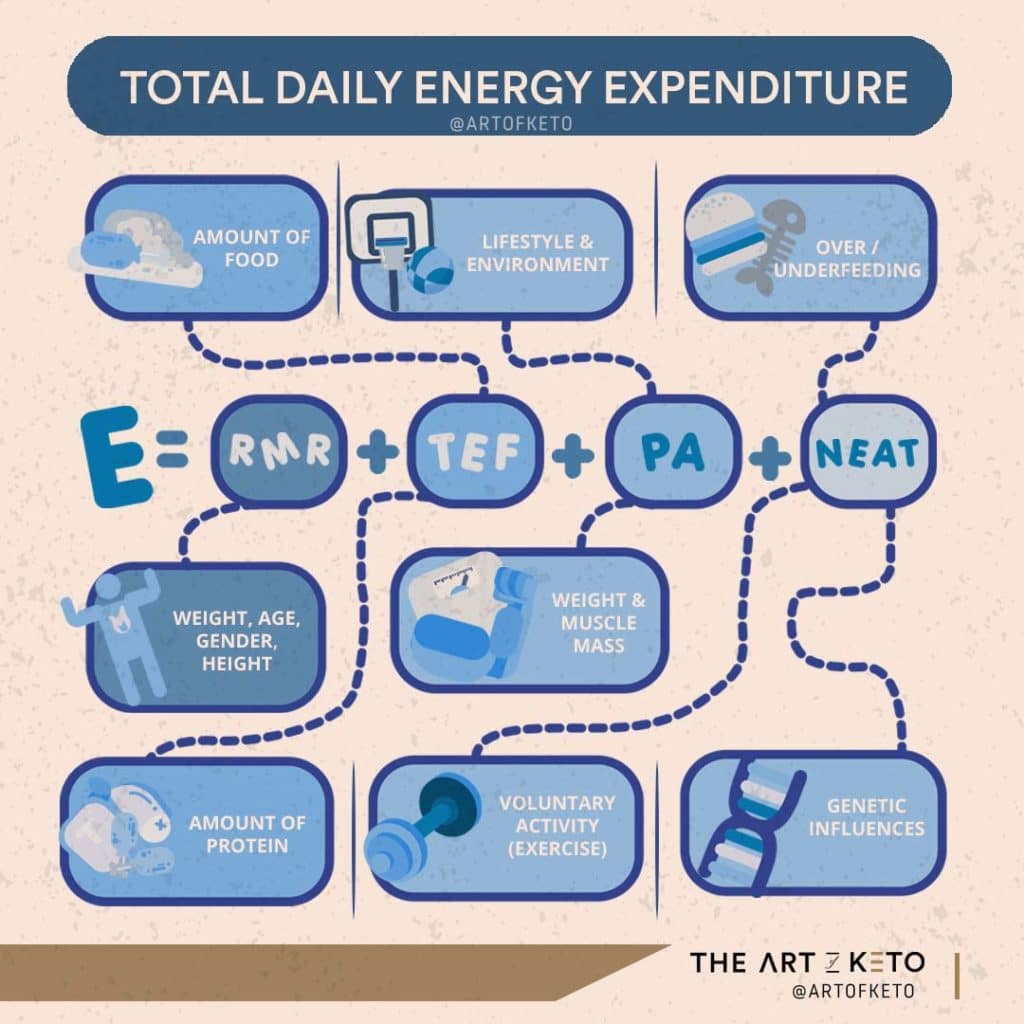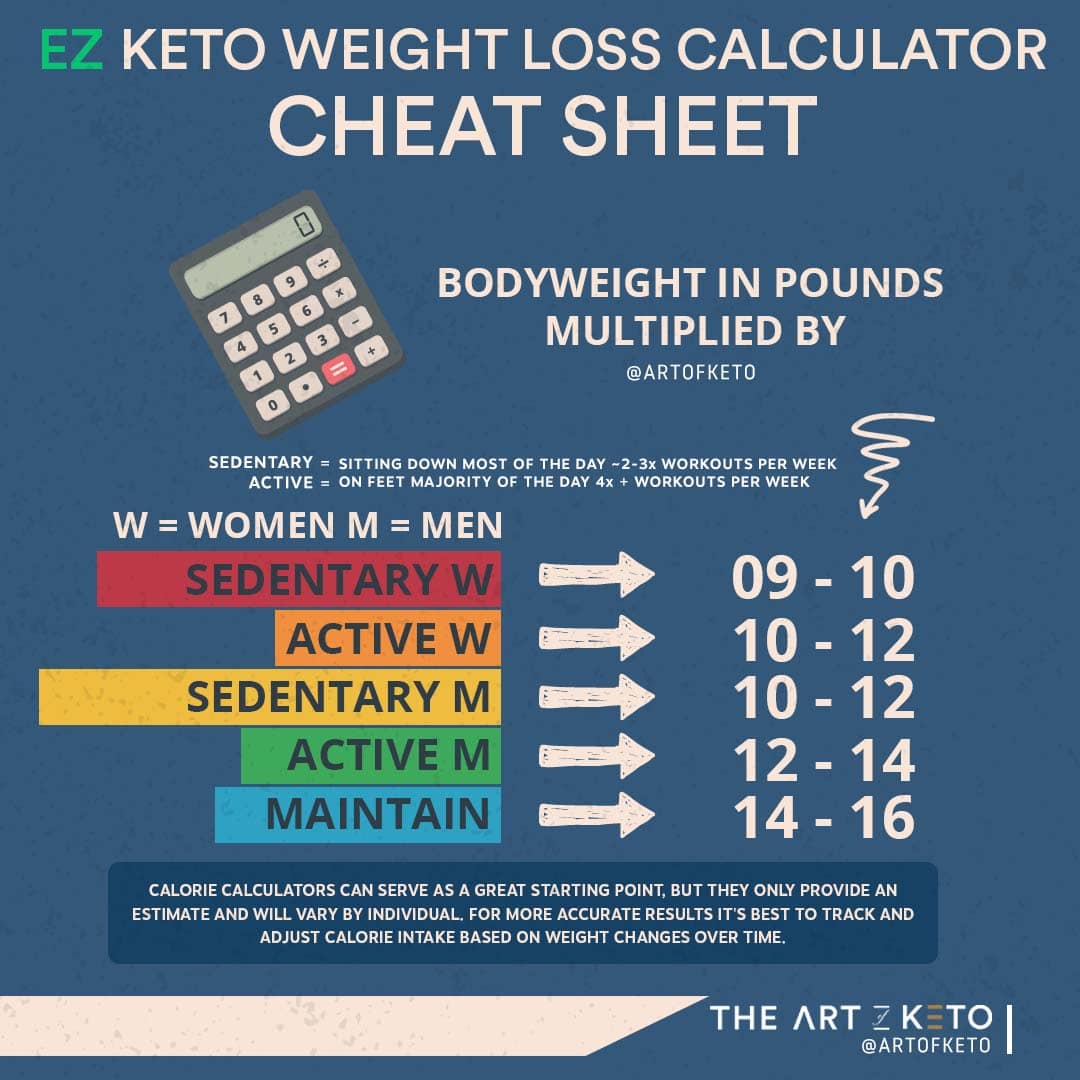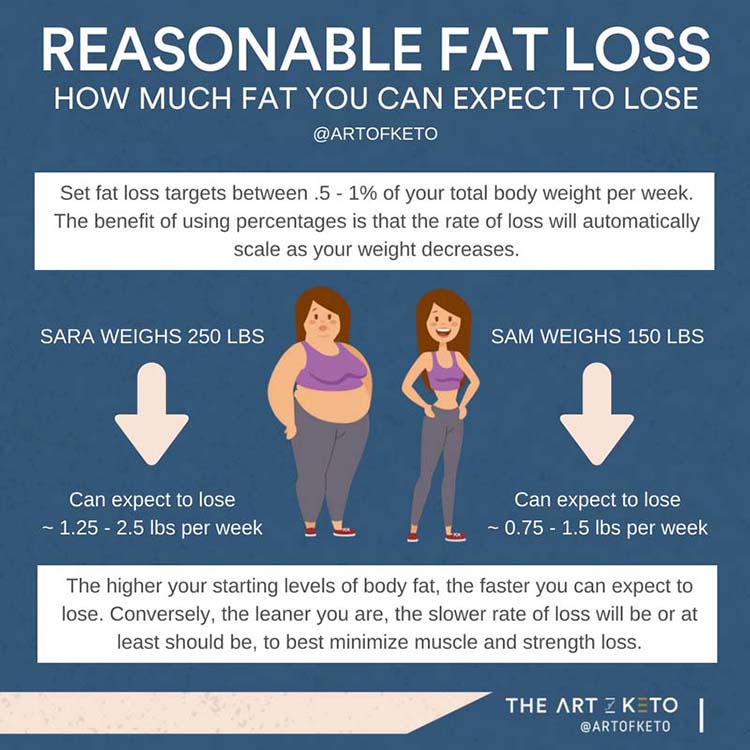How many calories should you eat? Do calories really matter on a ketogenic diet? Should I count calories? Yes, no, maybe? Here are my thoughts on how many calories you should eat on a ketogenic diet and how it can impact you.
Have you ever tried to lose weight? How about gain weight? If so, you’ll know that it’s difficult because there is so much conflicting information out there on the internet.
And as it pertains to the ketogenic diet it might even be more confusing since some say calories don’t matter. So, what do you do?
How many calories on a keto diet? How many calories on a keto diet you should eat will come down to how slow or how fast you want to lose or gain weight. This, combined with how many calories your body individually burns will determine how many calories on a keto diet you should eat.

First, let’s briefly address the elephant in the room.
You’ll often hear people throw around the argument of calories in vs. calories out and The First Law of Thermodynamics when it comes to losing or gaining weight – which states, energy cannot be created nor destroyed in an isolated system.
That’s all fine and dandy, and being a physics major, I definitely believe in the Laws of Thermodynamics.
The thing is… our bodies are far from being isolated systems.
It’s in my experience that calories DO matter , but it may not be as black and white as others have made it out to be. This article isn’t about disputing whether or not a calorie is just a calorie, so we’ll save that for a future discussion ya?
In a general, a calorie is a calorie and energy in vs energy out is quite logical so for arguments sake we shall assume it’s true as of now, but the nutrients of the food and your individual body’s biochemistry ultimately decides how your body will express (burn or store) those calories.
But back to the topic at hand…
Should You Count Calories On A Ketogenic Diet?
Many people have found success by counting calories while others get by just fine without. Which begs the question – should you even bother counting calories and If so, how many calories should you eat on a ketogenic diet to reach your desired goal?
The best answer I can give you is… it depends.
When it comes to counting calories, most people have trouble estimating what they eat, so keeping a diary is very helpful.
In some cases, people who claim they can’t lose weight by cutting calories tend to underestimate their food intake by 47
That’s quite the discrepancy if you ask me.
Another study says that people keeping a food diary six days a week lost about twice as much weight as those who kept food records one day a week or less.
Keeping a food diary or food log can have certain benefits such as:
- More mindful eating
- Identifying eating habits
- Accountability
In short, if only to get a baseline, counting calories will give you a better idea of the calories you’re taking in and allow yourself to make adjustments as you see necessary.

How Many Calories Should You Eat On A Ketogenic Diet
How many calories you should eat varies based on a multitude of inputs and outputs, a few of them being:
- the level of your metabolism
- activity levels
- state of health
- food composition
Before we discuss how many calories you should eat on a ketogenic diet for your desired outcome, maintenance calorie requirements should be determined.
How to determine maintenance calories
Maintenance level calories
Basically, how many calories you need to eat on a ketogenic diet (or any diet for that matter), to maintain your current weight.
Two ways to determine your maintenance level calories would be via food diary (your food log) or one of the various calculation methods discussed below.
Food diary method
This method requires keeping a food journal over a period of time, usually a week or two…
Though longer would be preferable and likely more accurate.
During this period, you would record every portion of food consumed, then calculate the number of calories based on what you jotted down.
If your weight was stable during this period then you can get a general baseline of what your maintenance calories are. If you gained or lost weight then you either ate more or less than your maintenance calories.
The food diary method, however does come with it some drawbacks.
Most people will not take the time to consistently record their food intake and studies show that the simple act of recording your food causes many to change their eating patterns and become more mindful about what they consume.
(as mentioned previously)

Calculation method
Utilizing the calculation method, we must look at the different components of one’s daily caloric requirement. They are:
- BMR (Basal Metabolic Rate)
– How many calories it takes to simply stay alive. If you were to do absolutely nothing but lay in bed and sleep all day, this is how many calories you would burn. This makes up roughly 60% of your calorie requirements. - NEAT (Non-Exercise Activity Thermogenesis)
– Energy expended for everything we do that is NOT sleeping, eating, or sports-like exercise. This may include such activities as performing yard work, typing on your computer, and even fidgeting. - EA (Exercise Activity)
– Self-explanatory, butenergy expended during actual exercise. - TEF (Thermic Effect of Food)
– About 10% of your daily energy output comes fromactual digestion of your food.

When you add all of these up, the final tally represents the estimated caloric intake needed to maintain your bodyweight. TDEE (Total Daily Energy Expenditure)
Maintenance Calories = (BMR + NEAT + EA + TEF)
You can use our easy plug and play keto macro calculator to determine this number.
The it's too easy to be true method
Ok, I know I said there were two methods, but another very basic way to estimate your daily maintenance calories is to simply multiply bodyweight in pounds by 15 or 16 as laid out in our Keto Quick Start Guide which is available below if you don’t have it already.
Women should generally stick to 15 while males will want to gravitate toward the 16 number. These values tend to correspond pretty closely to what you would get utilizing the calculation method above.

Which brings us back to the big question. How many calories should you eat on a ketogenic diet?
Setting Calories On A Ketogenic Diet
Now that we’ve established our maintenance calories, the number of calories it requires us to maintain the same weight, we will dive into the main concept of what determines whether or not you lose or gain weight…
Energy balance.
ENERGY BALANCE = Calories In vs. Calories OutSimply put, when energy balance is positive (calories in exceed calories out), weight goes up. When energy balance is negative (calories out exceeds calories in), weight is lost.
While calories IN is generally easy to determine the calories OUT part tends to vary based on a myriad of factors as stated in the introduction.
Truth is calories out is a moving target that varies based on everything from how active you are, how much you eat and even the composition of your food (fat vs. protein).
This is what makes the whole calories in vs. calories out equation a little over simplified, but in theory still applies.
How Many Calories Should You Eat To LOSE Weight On A Ketogenic Diet?
Typical advice to most dieters seeking to lose weight is to reduce calorie intake by 500-1000 calories per day which should theoretically yield a 1-2 lb fat loss over the course of a week.
Typically, it requires 3,500 calories below one’s maintenance calories to burn one pound of fat.
ex 500 calories per day x 7 days = 3500 calories (1lb)
When starting a fat loss diet, we recommend restricting your calories to no more than 10-25% below maintenance levels (as calculated above).
The leaner you are the closer towards 10% you should be and the more fat you have to lose the higher you can generally get away with before protein (muscle) loss is a concern.
I know what you’re thinking, and for you hardcore type A personalities like me I get you!
You’re probably thinking, the more I restrict calories the faster the fat will come off, right?
And we all want immediate results…
Because c’mon, who wants to diet forever?
I hear you, but patience will serve you not only in the short term, but long term as well.
While this does seem like sound logic according to the energy balance model of calories in vs. calories out, excessively low-calorie intake tends to be countered in the body by reducing metabolic rate and energy levels which slows fat loss.
So as a general rule, the total daily deficit, created through calorie restriction and/or exercise should not exceed 1000 calories total per day. This deficit can be achieved through a reduction in calories, an increase in exercise, or preferably a combination of both.
Based on our simple maintenance calorie calculation of 15-16 calories per pound, reducing calorie levels by 20% would place you at 12-13 calories per pound as a good starting point for fat loss.
Some individuals may need to reduce calories further while others can increase calories if they find themselves losing TOO much weight.
Just be mindful of your rate of weight
How Many Calories Should You Eat To GAIN Weight On A Ketogenic Diet?
While I want to say a good 80% of readers are looking to lose fat. There are a good number of you asking about muscle gain. Inevitably, there will be a point where one switches from fat loss into muscle building and this section is for you.
I’m going to assume you’re performing weight training as it is a requirement to stimulate muscle growth.
A good starting point, opposite of our calorie recommendation to lose fat is 20% calories over maintenance.
Again, based on our simple maintenance calorie recommendation of 15 – 16 calories per pound of bodyweight, this has most individuals at an intake of 18 – 19 calories per pound of
If you’re looking for a more concrete number as our 500 – 1000 calorie deficit recommendation for fat loss, we recommend a 250 – 500 calorie surplus for muscle gain.
Reason being, unlike the 3500 calories required to lose a pound of fat, it takes roughly 2800 calories to build a pound of muscle.
If you'd like to get into the nitty gritty, I've created two articles that go into detail on how to bulk on keto without gaining fat and a ketogenic diet bodybuilding guide.
To Sum It All Up
How many calories on a keto diet will vary based on your goals and starting point.
First, we must establish our total daily energy expenditure (maintenance calories), which includes our basal metabolic rate (BMR), exercise (EA), every day movement (NEAT), and even digestion of the food you eat (TEF).
With the over simplistic calculation method this puts most people at 15 – 16 calories per pound of bodyweight.
For a more accurate calculation you can track using a food diary over the span of a week or two possibly with a longer time frame (1 month), which is likely to yield more accurate results.
The even more accurate method is the calculation method which you can use our convenient calculator below to plug in the variables.
When it comes to fat loss, a good rule of thumb to avoid metabolic slowdown is to stick with one of the follow:
- An initial deficit of 10-25% below your maintenance
- 500 – 1000 calories below your maintenance
- Multiply bodyweight by 12 – 13 calories per pound
When it comes to muscle gain, a good rule of thumb to avoid excessive fat gain is to stick with the following:
- An initial increase of 10-20% above your maintenance
- 250 – 500 calories above your maintenance
- Multiply bodyweight by 18 calories per pound
Lastly, these are general recommendations and starting points. Tracking changes in body composition will give you the best indication of whether to increase or decrease calories to fit your goals.
General Recommendations
Fat loss: 1 – 1.5 pounds a week with leaner individuals leaning (no pun intended) towards the lower end.
Better yet, you can set fat loss as a percentage of bodyweight between .5 – 2.5% with 2.5% reserved for the very overweight.
Muscle gain: .5 – 1

Frequently Asked Questions
What happens if you don't eat enough calories on keto?
If you don't consume enough calories on keto, your body went into starvation mode. As a result, it will hold on to fat instead of burning.
How many calories should you eat on keto?
There are no set definitions for how many calories you should consume on the keto diet. However, the general rule is somewhere between 1800-2000 calories for women and 2200-2400 calories for men.
How many calories can you burn on keto?
You burn more calories on keto than a person that's not dieting. The increased metabolism helps you burn more calories than the average person.
